- Home
- David Bernstein
Amongst the Dead
Amongst the Dead Read online
Dedication
This book is for Sandy and my family. Mom, for always supporting me and encouraging me in whatever I do and for being there when I need you. Dad, for your strength and words of wisdom and always making sure I didn’t take the easy way out. Adam, bro, for always being in my corner and understanding what it is to want to live your dream. And finally, Sandy, my better half, for loving me, understanding me and always being there for me.
I would like to send a special thank you to Don D’Auria for all that he has done, including taking the time to meet with me, read my novel, and then give it a great home.
I’d also like to thank the following people for their help, support, guidance, and kindness: Jonathan Maberry, Ronald Malfi, Joe McKinney, Eric S. Brown, Kristopher Rufty, Aaron Dries, Gregory Norris, Craig Saunders, Alan Spencer, David Dunwoody, Pete Bevan, Douglas Clegg, and Gillian Flynn for hyping me up to pitch my novel.
Prologue
The Father
The log cabin sat within a small clearing of the Catskill Mountains two miles north of the minute town of Roscoe, New York. The hamlet had been a resting point for travelers, its location just off Route 17, a busy highway used by people traveling from New York City to Binghamton. The nearby Beaverkill River, combined with the cabin’s wood stove, supplied drinkable water.
Two beds stood off in the far right corner of the bungalow, separated by a nightstand made from tree limbs. Each bed had a down pillow and two wool blankets, keeping the occupants warm during the wintry nights.
The cabin was stocked with food. Canned goods, jarred vegetables, beef jerky, pasta and oatmeal filled the shelves in the underground basement—a rough, but rather spacious, dug-out pit beneath the cabin. A red Oriental-style throw-rug covered the hidden door leading to the food supply.
Bill and his daughter, Riley, were blessed to have found the place and wondered for the first few days if the original owners would show. No one ever did.
Bill approximated that the food would last about three months between the two of them. They would dig in, rest for a spell; at least until the harsh winter ended. That was all before he became infected, having less than a few days to live.
The infection was spreading rapidly. He’d dug a grave, fifty feet from the cabin, as soon as he came back from Roscoe. His right arm had lost most of its color, becoming a chalky white, and was cracked with purple veins by the time he went to bed. He’d been bitten while scouting for supplies in the small town. It had seemed vacant, like most others this far north, but a group of the undead had been hiding out in one of the desolated stores.
The living dead were known to become docile when food wasn’t present, like a computer monitor switching to sleep mode, as if they were conserving power. Bill never understood why they needed energy; they were dead after all. Maybe it was the whole energy could never be destroyed, only converted into another form concept. Or maybe the living dead needed energy the way a living thing did.
Not much was known about the human brain, even in the year 2020, but for some reason it functioned in the undead. A zombie’s brains could get blown out, but if the brain-eye connection wasn’t severed in the process, the undead would remain active.
The eyes of an undead had an eerie, radiant-like quality as if they held a source of power. Usually a shot to the head was enough to sever the connection—the optic nerves running to the center of the brain where they met, before splitting into two again and extending into the back of the head—but taking out the eyes themselves was a sure way to stop them.
Bill had entered four stores, looking for supplies during his time in town, when the fifth proved fatal. Four zombies sprang at him like hungry hyenas on a weakened prey.
He’d managed to take out three with his .30-30 rifle, his speed and former military training proving handy. The fourth, however, grabbed him. Man and zombie wrestled, slamming into walls and thrashing about, sending empty bottles and cardboard boxes sailing. During the struggle Bill dropped the rifle, his hand slipping up high and grazing the creature’s mouth. He felt the nauseous sting of rotten, infected teeth puncture his skin. The zombie held on like a pitbull, biting down with ferocious force, taking a large chunk of Bill’s fleshy hand.
He needed to chop off his infected arm before it managed to spread, but the zombie wanted more of his flesh.
Bill dove, grabbed his rifle from the floor and managed to get the weapon under the creature’s jaw. He pulled the trigger and sent a splattering of brain and skull matter to the ceiling. The zombie’s left eye went dim, but the right was still aglow. The creature attacked, slamming its fist into his temple as he got another shot off, blasting its right eye to hell. The creature slumped to the floor like it was made of blubber, but the impact from its punch sent Bill flying backward. He bashed his head against the countertop’s jagged edge, knocking him unconscious.
He awoke four hours later; amputation of the infected area no longer an option. The sickness had had enough time to spread throughout his body.
The disease, or virus, was spread through the blood stream, killing cells as it traveled. He’d bandaged the wound, hoping there was a chance he’d be okay, but that evening his joints were already aching. By the next morning he found it difficult to move his limbs, experiencing the beginnings of living rigor mortis. He hadn’t told his daughter; the thought of her alone in the world was horrifying.
Since the planet’s initial outbreak, in 2020, Bill had been keeping a journal of their travels, sights and methods of survival. And since returning from town, he’d spent his time writing down everything he could for his daughter. Every military tip he could think of, adding precise details for fishing, boiling water, cooking meat and hunting. Tears fell on the paper as he wrote, blurring some of the words.
When Riley was awake, he spent every second with her while teaching her the basics of self preservation, and giving her as much love as he could. She was only twelve.
She had asked him why his hair was falling out, if he was feeling all right, and why he looked so weak. And every time she asked a question, he would answer the same, telling her not to worry and that he’d be okay.
Alone, the food would last her eight months. He’d already taught her how to shoot; a necessity for surviving in a world gone to hell. Her shoulder, from practicing over time, had hardened, making the rifle’s impact no longer a problem. Bill’s time was up.
“Daddy’s going away,” he said, her azure eyes locking onto his. He stared into the extension of himself, the female version, her silky dark hair hanging off her shoulders like angel hair spaghetti.
“When will you be back?” she asked, gripping his hand, worried.
He was sweating, the fever reaching delirium levels.
“I’m sick, baby. I don’t have any time left.” He paused, holding back tears. “Everything is prepared, a bit rushed but ready, nonetheless. You don’t have to worry about food or water for some time.”
His head ached as if a hammer pounded at it. He was having a difficult time concentrating. “Wait here,” he said, getting up off the bed. He walked over to the mirror hanging on the wall; his reflection was sickening, as if staring into the face of a severely burned radiation victim. His hair was almost gone, with strands poking about in patches. Blackened teeth lined his bleeding gums; his eyes were sunken in and hollowed out revealing the skull beneath. The face he looked upon so many mornings was now an unfamiliar gaunt mess, void of color and lined with sweat.
“I have to go now,” he said, turning to his daughter. He was amazed at how little she’d asked about his condition as it worsened hour by hour. She had believed him when he told her not to worry.
“No, Daddy,” Riley cried, jumping off the bed, running to him and wrapping her arms
around his torso. Bill let her have her last good-bye before pushing her away.
He had thought about telling her how truly special she was, but what was the point? Riley was twelve and would be hitting puberty soon. He had no idea what would happen then. Nothing about her condition was known for certain, and telling her could lead to her doing something careless. So he decided it was best to keep her past a secret. She needed to be on her toes, cautious.
“I love you, Riley. Always and forever.” He turned, grabbed the rifle—knife attached to his belt—and left, closing the door behind him.
He limped, brushing aside prickly pines and bare branches, leaving a dogged trail through the snow-covered forest. His right leg dragged as it refused his commands. When he made it to the grave he turned and stood with his back to it.
If done correctly he should fall backward, collapsing and breaking through the branches he placed across the hole. The forest leaves, twigs and other debris should cover him enough. He didn’t want his daughter burying him or seeing his dead body when she came for the rifle. He’d left her with the .38 snubnose revolver. A nice piece for close encounters, but she’d need the rifle for hunting and long-ranged defense.
He picked up a small branch and bit down on it before raising the knife to his left eye and jabbing himself with the tip. The eyeball ruptured, its juices exploding like a jelly-filled balloon. He moaned, wanting to scream from sheer terror, but his daughter might hear.
With blood and eye fluid leaking down his cheek, he spit out the piece of wood. He placed the rifle against his good eye and pulled the trigger, knowing his daughter was special and would be fine.
Chapter One
Emergence
Riley ate canned fruits and vegetables, beef jerky and oatmeal; goods from the stored supply in the cabin’s basement or “pit” as she liked to call it. She hunted wildlife, wisely adding to her food supply. Deer, squirrels and rabbits were the most abundant edible animals in the area. Riley learned first hand from her father how to gut, clean and treat the animals’ hides.
It had been two months since he passed away, blowing his brains out and having no choice in the matter. He’d been bitten and infected, almost becoming a member of the living dead. Two days after hearing the gunshot, she found her father’s grave, his body obstructed by forest debris.
Riley hadn’t wanted to see his body, but the rifle was too valuable to leave. She had the .38, but she needed the rifle.
After retrieving the weapon, she cleaned it, using the oils and brushes from the gun cleaning kit. Besides what was written in her father’s journal, she’d learned how to clean a firearm long before the world went to hell—her father having been an avid hunter.
Nights were rough. Riley had never been so alone and afraid in her life. Her father’s rotting corpse was no comfort, like it might’ve been had it been properly buried underground.
The cabin was a good two miles from the town of Roscoe. Riley and her father had come by way of Oneonta, a small college town further north. After their car broke down they’d had to walk, finding the cabin by chance after following a deer trail through the woods.
The cabin had been a miracle if there ever was one.
Sitting on her bed and reading—her father made sure she had taken a few books with her and explained how literacy was of the utmost importance during a time of degradation and hostility—Riley was startled when the alarm outside the cabin sounded. It was a simple yet effective design: a wire tied to tin cans and bottles. She jumped out of bed, grabbed the rifle and looked out the window.
Two men were approaching. Rule number one flashed across her mind: Don’t trust anyone. Lonely and scared, Riley desperately wanted company, but inviting in two grown men was too risky.
She cracked the window open, aimed near the men’s feet and fired, the shot echoing through the forest like a banshee. It was the first time she’d heard a gunshot since her father’s death. A chill ran down her spine causing her to shiver.
“Don’t shoot,” one of the men yelled, hands up. The other had run for cover behind a tree.
“Turn around and go back the way you came,” Riley warned.
“Our party was killed in town. We’re in need of food and water. Please, help us.” The men didn’t appear hurt or feeble. They had thick beards and wore filthy clothes, but looked well fed. They had on large backpacks, giving them a hulking appearance.
“Come any closer and I’ll shoot your damn heads off,” Riley said.
The men began mumbling to each other before the one standing out in the open spoke up. “Are your parents home?”
She couldn’t let them think she was alone; they’d never leave. “Out hunting and probably on the way back after hearing gunfire.” She wanted to fire another shot, but wasting ammo was ill advised.
“Okay, we’re leaving,” the man said. He turned, his companion joining him. Riley watched their forms grow smaller, before disappearing into the forest.
She kept an eye out for the next couple of hours, surveying the forest for movement, and making sure the men didn’t return.
That evening, she ate dinner, made tea and read more of the book she’d been enjoying earlier. She read by lantern light, unable to fall asleep, afraid the men might return. Normally at sundown she went to bed, not wanting to waste the lantern’s gas. She grew sleepy a few hours later, rechecked the windows and locks before turning off the light. She awoke during the night to the sound of glass crunching. Another alarm triggered.
“Shit,” a man’s voice whispered.
“Quiet,” the other male voice said.
Silently, Riley jumped out of bed. She fixed the covers, making them neat. Slinging the rifle’s strap over her head and grabbing the lantern, she headed over to the rug covering the pit’s door. While pulling up the rug, a loud crashing noise erupted from the front door. The men were trying to break in. Her pulse quickened further as she frantically yanked the trap door open. The men continued to bash away at the door, the lock holding.
She lowered herself down the stairs, the pit’s cool temperature seizing her body like an invisible phantom.
Crouching on the stairs, she placed the lantern on one of the steps. She reached over the trap door, grabbing the carpet with the door, and pulled it almost to a close. Poking her hand through the opening, she jimmied the carpet so it covered the trap door completely. An explosion of wood and metal sounded. The men had broken the lock off and made it inside. Riley quietly lowered the door shut.
The men’s footfalls thumped along the wooden floor, muffling when they crossed the carpet. “Nobody here,” one of the men said.
“Damn. Hearing that female voice got my loins working,” the other man said. They both laughed.
“Search the place.”
Riley stayed huddled on the stairs, too afraid to move. Crashing sounds from above made her wince; the men must have been tearing the place to pieces.
“No food except for uncooked noodles, tea and some beef jerky,” one man said.
“Grab the jerky. Hell, grab it all.”
The men’s footfalls kept clomping against the floor as the minutes passed. After a time, Riley’s legs began to stiffen.
“Look what I found,” one of the men said.
“Nice, a .38,” the other said.
Riley cringed, wanting to slap herself. She’d forgotten the handgun upstairs.
“It’s loaded too.”
The crashing and bustling ceased after awhile, the men deciding to sit and relax. The cabin wasn’t large and most of the good stuff was in the pit. Riley’s legs were numb with pins and needles flowing through them as she carefully adjusted her position. She desperately needed to stretch and descending the stairs was her only option. She should’ve made a move when they were busy. Now the stillness, save their voices, was detrimental.
“We’ll wait for them to return,” one of the men said. “I need a woman.”
How long would they wait? Would they leave eventually? If for a
nything, to find food when the trace amount was finished? She was safe in the meantime. And could eat and drink all she wanted until the men left. Carefully, she began descending the stairs.
She took each step cautiously, extending one leg at a time and leaving the lantern behind.
Her descent was terrifying, the cool air gone, as sweat dripped from her face and soaked her clothes. The darkness added to her plight. After what seemed an eternity, Riley’s foot connected with hard earth, and she was grateful for its presence. She hadn’t felt such a powerfully satisfying emotion since last hugging her father.
Far below the intruders, she would be out of harm's way. She couldn’t see in the gloom as the pit’s interior was windowless.
Arms out, gun strapped to her back, Riley walked forward looking for a place to sit. Her legs were shaky, but stable enough.
She reached a bench, and sat for what seemed like hours. The men kept chatting and laughing. Lost to her thoughts—the only things to see—the coldness of the room crept into her bones. The sweat that had lined her body was making her shiver. And she had to pee.
She removed the gun from her person, placing it on the bench, and slowly moved across the pit. She had decided to urinate as far from the bench as possible, not knowing how long it would be her resting area.
Halfway across the room, she stepped on a can of beans. It rolled out from under her as she lost her balance. Her ankle gave out, twisting awkwardly, causing her to stumble to the ground. A jolt of pain shot up her body, escaping her mouth.
She lay on the dank ground, her ankle throbbing, hoping the men hadn’t heard.
“What the hell was that?” one of them said, a chair scraping across the wooden floor.
“Sounded like a kid got hurt,” the other man said.
Riley lay on her side, holding her ankle. She heard the men scrambling about. She needed to get back to the bench, to the gun.
Standing wasn’t an option. She crawled, wincing with each lift of her right foot. Tears filled her eyes as she bit her lip, holding back the need to scream.

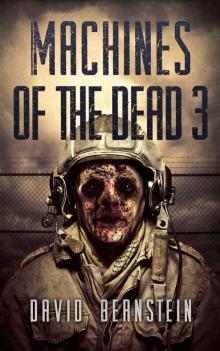 Machines of the Dead (Book 3)
Machines of the Dead (Book 3)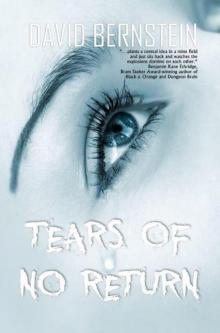 Tears of No Return
Tears of No Return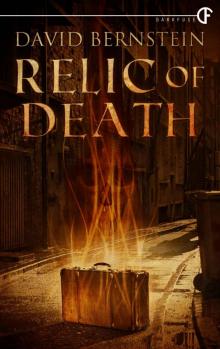 Relic of Death
Relic of Death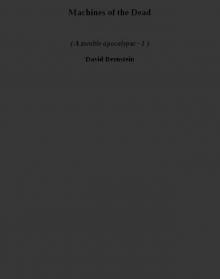 Machines of the Dead aza-1
Machines of the Dead aza-1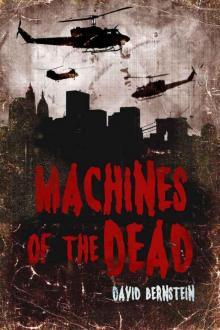 Machines of the Dead
Machines of the Dead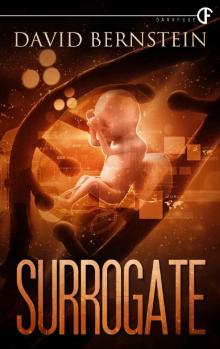 Surrogate
Surrogate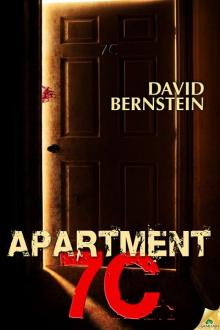 Apartment 7C
Apartment 7C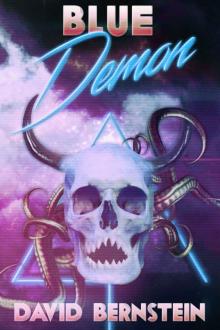 Blue Demon
Blue Demon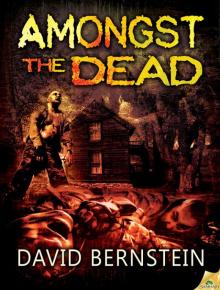 Amongst the Dead
Amongst the Dead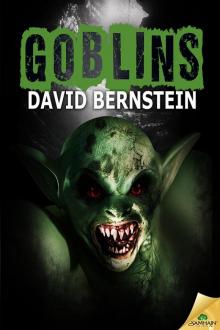 Goblins
Goblins Witch Island
Witch Island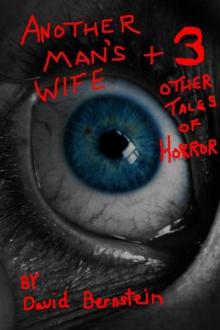 Another Man's Wife plus 3 Other Tales of Horror
Another Man's Wife plus 3 Other Tales of Horror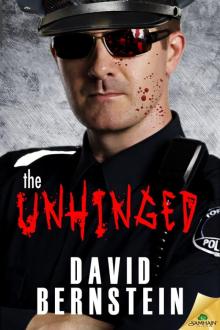 The Unhinged
The Unhinged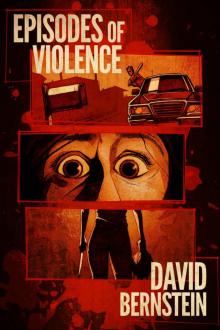 Episodes of Violence
Episodes of Violence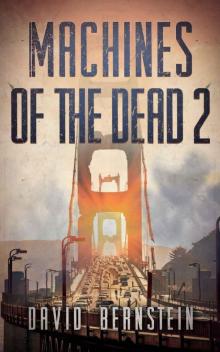 Machines of the Dead (Book 2)
Machines of the Dead (Book 2)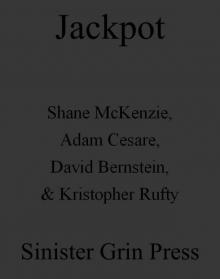 Jackpot
Jackpot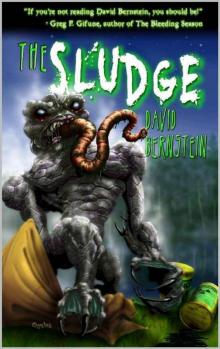 The Sludge
The Sludge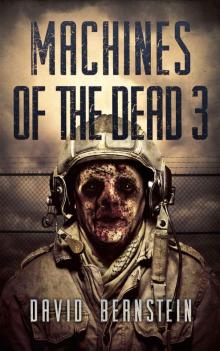 Machines of the Dead 3
Machines of the Dead 3